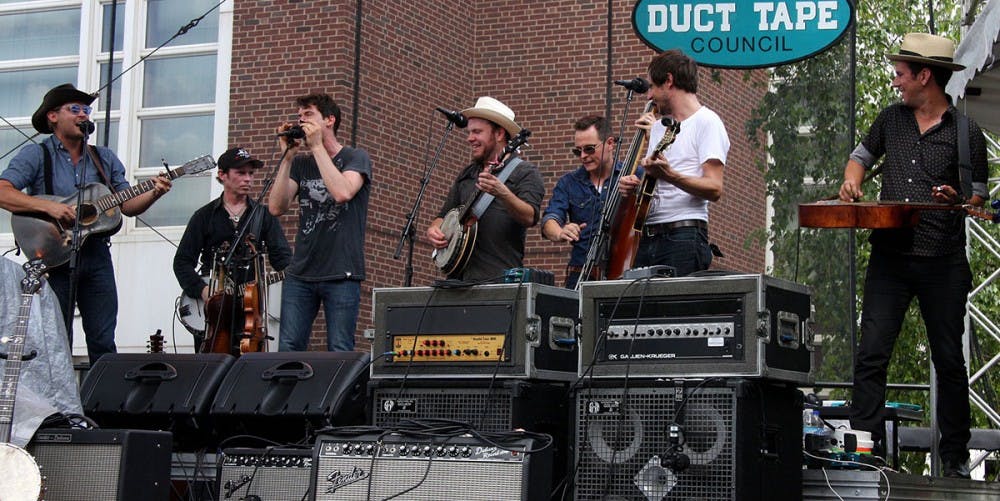“Here comes Critter with the squeeze box,” announced Old Crow Medicine Show frontman Ketch Secor during the band’s first set at the Sprint Pavilion last week.
If the names Critter and Ketch and the reference to a “squeeze-box” weren’t indicator enough, Old Crow Medicine Show plays mountain music. They are the purest bluegrass band to achieve mainstream popularity in the 21st century. They unabashedly embrace the quirky traditions of the music they play, yet their act retains undeniable modern vitality — a tough balance to achieve.
First formed in 1998, Old Crow spent two years busking on street corners before being discovered by influential country guitarist Doc Watson. The group’s most famous song is “Wagon Wheel,” a modern campfire classic that Secor completed at age 17 from a rough-edged Bob Dylan outtake. Only a 17 year old would have been foolhardy enough to rewrite a Dylan song, but the track became the band’s breakout hit. “Wagon Wheel” has eclipsed the rest of Old Crow’s discography, but the group’s eight studio albums are filled with delightful, lively bluegrass music. Old Crow’s rollicking banjo-picking helped pave the way for successful folk-pop acts like Mumford & Sons and The Lumineers. The group has been a member of the prestigious Grand Ole Opry in Nashville since 2013.
Like the bluegrass music they play, Old Crow has roots in the Blue Ridge. Secor and guitarist Critter Fuqua met each other in middle school in Harrisonburg, Va. “Rockingham County I was born and raised / I’ll be a Rock-town rocker for the rest of my days,” sings Fuqua on the band’s new song “Dixie Avenue.” The group lived in Charlottesville during 2005 and 2006. Secor emphasized the local connection while he was onstage. “Aw man, them Shenandoah County girls,” he howled with a grin. “Ate a lot of potato-flour donuts,” Secor said of his time in Charlottesville, alluding to the famous downtown donut store Spudnuts that closed in 2016.
At the concert Thursday, Secor made the band’s intentions clear from the start, declaring that the band was “Singing some of that good ol’ timey music here in Charlottesville.”
Secor and the rest of Old Crow have long been focused on “that good ol’ timey music,” dutifully working to keep the traditional music of the mountains alive in the 21st century. “The ‘Don’t trust anybody over 30’ [attitude] was really ‘Don’t trust anybody under 30’ for me,” Secor said in a New York Times interview this month. Secor is optimistic about the genre’s future. “Fiddles and banjos won’t be denied,” Secor told the New Yorker in 2014. “I believe they’ll outlast most other American institutions.”
Bluegrass means more than just banjos and fiddles — Old Crow’s songs tell the stories of flyover states and forgotten hollers, just as country music always has. Their latest album, “Volunteer,” released April 20, features a number of notable yarns. “Dixie Avenue” tells the bittersweet story of a young couple growing up and getting stuck in a small town; “Old Hickory” tells about Virgil Lee, a guitarist who “kindly mistook / the devil for a dear friend.” Other songs explore less well-worn territory — “A World Away” is a yearning tale told from the perspective of an immigrant.
Emphasis on musical preservation and deference to tradition are not generally indicators of mainstream success, but Old Crow has built a dedicated following while remaining committed to the fundamentals of their music. The secret to their balancing act was apparent on Thursday. They temper their love for tradition with a healthy dose of rock-and-roll showmanship. Secor is lanky and lithe — bouncing around the stage he looked like Jack Skellington in cowboy boots. The six-piece group never stopped shuffling and rearranging, sending a trio of fiddles to the front for a few numbers then later all gathering around the mic to sing a few traditional spirituals. A cheetah-print-clad bongo player joined the group for “A World Away.” Keyboardist Cory Younts twice took the front of the stage to accompany the music with spirited tap-dancing.
Old Crow Medicine Show plays traditional bluegrass music, but they don’t play it traditionally. They don’t stand in a horizontal row and let the violins do the talking. Old Crow frolics and dances, hoots and hollers, and never stops smiling. This energy is their best defense against becoming an anachronism. They’ve convinced 21st-century audiences to love bluegrass simply by loving it so much themselves.







